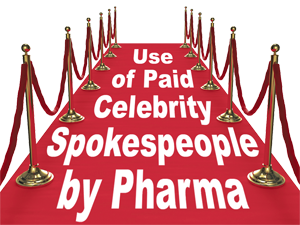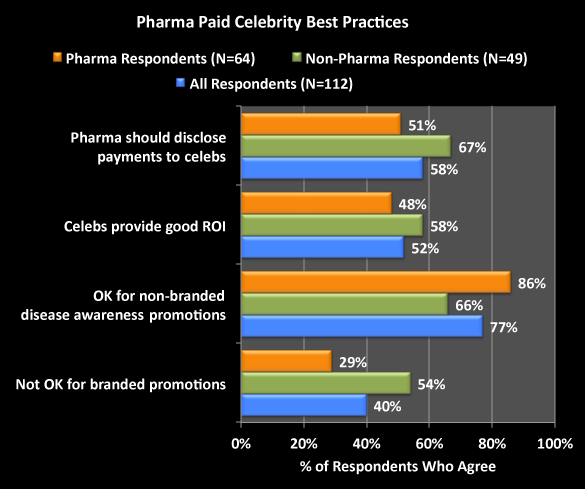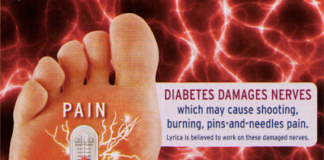Pharma Paid Celebrity Best Practices Should Pharma Disclose Payments to Celebrity Spokespeople? Pharma marketers in the U.S. sometimes use celebrities as spokespeople for their branded drugs or for non-branded campaigns. Such celebrities include TV personalities, athletes, movie stars and others who have thousands or millions of fans, Twitter followers, etc.
Pharma marketers in the U.S. sometimes use celebrities as spokespeople for their branded drugs or for non-branded campaigns. Such celebrities include TV personalities, athletes, movie stars and others who have thousands or millions of fans, Twitter followers, etc.
Compensation
The subject of compensation for for celebrity pharma spokespeople was brought up in a Pharma Marketing Talk interview of Ambre Morley, Associate Director, Product Communications, Novo Nordisk, regarding Paula Deen, the celebrity chef who was hired by Novo Nordisk as a diabetes spokesperson (read/listen to “Novo Nordisk Defends Choice of Paula Deen as Diabetes Spokesperson”).
Obviously, Deen is being paid to do the deed, but she doesn’t want to talk about money because it’s “garish” according to her. But for pharma marketing pundits, talking about how much money is spent in the different areas of pharmaceutical marketing is a valid topic. We’d like to get a better idea how much money the drug industry spends on celebrity spokespeople as opposed to running DTC ads or wining and dining key opinion leaders, for example.
When Morley was asked the money question, she demurred and said “We don’t discuss compensation. If Paula was a regular, everyday employee, I couldn’t tell you how much she is making. I can’t tell you how much I’m making nor would I ask you how much you’re making.”
A few years ago, the pharma industry could have used the same excuse for not revealing how much they paid physicians as speakers, consultants, key opinion leaders, etc. But today there’s the Physician Payment Sunshine Act, which requires that all pharmaceutical companies reveal details about the payments they make to physicians (see “Proposed Rules for Physician Payment Sunshine Act”).
Of course, the main reason why this law was passed was because of potential conflicts of interest — physicians who are paid by pharma companies may be more likely to prescribe the drugs of those companies. Often, those drugs are more expensive than other, equally-effective products (eg, generics). Congress has a fiduciary duty to make sure that the government doesn’t overpay for services such as Medicare re-imbursements for prescription drugs. Consequently, the impetus for passing this law.
Influence of Celebrities
Celebrities, however, do not have the power to directly prescribe drugs. But they are VERY influential. Morley admits as much: “When you talk about the pharmaceutical industry and it’s spend on celebrities, it’s interesting because you wouldn’t see celebrities working on campaigns if it wasn’t a good investment from a marketing point of view.”
Given the power of of celebrities to influence people, should pharmaceutical pharmaceutical companies disclose the details of payments made to celebrities like like they are required to do for physician payments?
Survey Results
That’s just one of the questions Pharma Marketing News asked in its “Use of Paid Celebrity Spokespeople” survey. The survey specifically asked respondents to indicate how strongly they agreed or disagreed with the following statements regarding the use celebrities as pharma-paid spokespeople.:
- Celebrities should NOT be paid to promote branded drugs.
- It’s OK to pay celebrities to participate in unbranded disease awareness campaigns.
- Celebrity spokespeople provide a good return on marketing investment (ie, increase sales) for certain Rx drugs.
- Each pharmaceutical company should be required by law to publicly disclose how much money it pays every celebrity for being a spokesperson.
The results are summarized in the following chart, which shows the percentage of respondents who strongly agree or somewhat agree with each statement (N=112). Pharma Respondents (orange bars, N=64) are comprised of people working within pharmaceutical companies or agencies that work for pharmaceutical companies. Non-Pharma Respondents (green bars, N=49) are everyone else (consumers, healthcare professionals, academics, and publishers/bloggers).

Of the Pharma Respondents who agreed that each pharmaceutical company should be required by law to publicly disclose how much money it pays every celebrity for being a spokesperson, 57% Strongly Agreed and 43% Somewhat Agreed. Only a very small percentage (3%) were neutral.
Comments from Pharma Respondents include:
- “If a celebrity spokesperson will help raise awareness and get more patients appropriately diagnosed, I think it is a good thing for patient health. However, like full disclosure with HCP speakers’ compensation, I think it is appropriate to have full transparency with celebrity spokespeople pay also.” — Anonymous employee of a pharma agency
- “I think disclosure is the key. It’s ok to pay celebrities to promote branded drugs or disease awareness if payment is disclosed. I agree that there should be a legal requirement to disclose payment, however, I don’t think AMOUNT of payment is relevant, especially from a legal point of view.” — Anonymous pharmaceutical company employee
- “If it raises awareness around a disease that is growing every month, that can only be a good thing. It also does something that is normally praised – it includes content that allows people to live better. Agreed, if it was just her saying its great, that would be somewhat useless, but I like the site that allows for free lifestyle advice as well as advertising the product. On the other hand, as a Brit, I cannot believe how contrived Deen is – does this really work? This would flop in Europe I feel.” — Miles Denison, Project Manager, Basil Strategies
- “Celebrity endorsements are a common advertising practice in all other product categories and most don’t even use the product they are hawking. I find no problem with celebrity endorsements for Rx drugs or disease awareness campaigns, when the celebrity truly has the disease and endorses the drug. And they should be paid like any other spokesperson for their time.” — Maureen Hall, Digital Strategy / Media Maven, Connecting People+Brands
- “I strongly disagree that the company ‘should be required by law’ to disclose that amount of money paid to celebs. I do believe PhRMA should encourage disclosure and transparency in guidelines.” — Tom Jones, Group Vice President, Makovsky Health
- “A pharmaceutical company should be under the same obligations as other paid celebrity endorsers. In my opinion, it’s OK for the celebrity to mention they take the drug, but they should not discuss how the drug has affected their disease or quality of life. — Dana Webster, Marketing Project Manager, Avant Healthcare Marketing
- “We have to stop talking to patients as though they are all upper middle class, college-educated, and medically literate.” — Anonymous employee of a pharma agency
- “What is the point of all this pharma reporting? If I tell you that Paula Deen is making $10M or $1M, what difference does it make? I’m sure she’s making a lot of money. But that is driven by her market worth and the specifics of the contract (length of contract, number of events, etc.). There’s no realistic way for the public to understand (or care about) that context. So what is the point?” — Anonymous pharmaceutical company employee
- “If a celebrity has a genuine medical condition, and gets paid a modest amount of money to promote a big brand, that is one thing. If they are “meant to represent the target demographic” and are getting paid millions, that is another. We know how much Tiger Woods got from Nike, why can’t we know what Paul Deen got from Novo?” — Anonymous employee of a pharma agency
Comments from Non-Pharma Respondents include:
- “The public should be informed about paid spokespeople. Media should ask and place a paid endorsement in the advertising sections.” — Anonymous consumer
- “The business of business, and this includes pharmaceuticals, is to make money. There is an inherent conflict of interest in involving pharma in providing “information” which patients (or physicians, and this one is well-proven by research) are encouraged to believe is simply informational. Sales are sales. Advertising is advertising. Impartial information does not come from pharmaceutical houses. Period.” — Anonymous healthcare professional
- “It is just ethically wrong to use a celebrity NOT suffering from a disease to market a drug. In the case where a celebrity markets a drug that treats a condition that he/she is suffering from; it makes even less sense to be monetarily compensated. In this situation, the reason for agreeing to market such a drug is to convince co-sufferers of its benefical effects. Considering that the celebrity has first hand experience of the suffering; one would imagine (and rightly so) that an altruistic motive would prevail over currency..” — Anonymous healthcare professional
- “Pharmacy companies use celebrities because it works. Our culture endows celebrities will many attributes they probably don’t have, including (apparently) medical knowledge. The public seems to think “it worked for them & they’re very successful, so if I copy them, I’ll be successful, too.”” — Anonymous publisher/blogger
- “I feel that unbranded campaigns could be much more powerful – I was recently looking at some smoking cessation materials and found it interesting to read about the different delivery mechanisms for smoking cessation drugs, as well as what the myths and realities are of this addiction. Pharma should embrace opportunities to collaborate in this area and join budgets for improved reach.” — Albena Georgieva, Senior Executive Producer, marcus evans
- “I’m completely turned off by celebrities endorsing products – period. I’m probably less likely to buy something endorsed by a celebrity, whether it’s on TV, in print, or in a store (e.g., a collection of clothing). I wonder to myself what kind of mentality thinks something is better because it’s associated with someone well-known or important. I figure it’s the same person who believes every negative political ad they view.” — Fred Davis, a consumer
- Novo Nordisk Defends Choice of Paula Deen as Diabetes
- Use of Celebrities for PR and DTC Advertising
- Use of Patient Testimonials in DTC & Social Media
PMN118-02
Issue: Vol. 11, No. 8: September 2012



![6 Digital Tools at the Center of Healthcare Digitalization [INFOGRAPHIC]](http://ec2-54-175-84-28.compute-1.amazonaws.com/pharma-mkting.com/wp-content/uploads/2021/04/6DigitalTools_600px-218x150.jpg)




![6 Digital Tools at the Center of Healthcare Digitalization [INFOGRAPHIC]](http://ec2-54-175-84-28.compute-1.amazonaws.com/pharma-mkting.com/wp-content/uploads/2021/04/6DigitalTools_600px-100x70.jpg)




